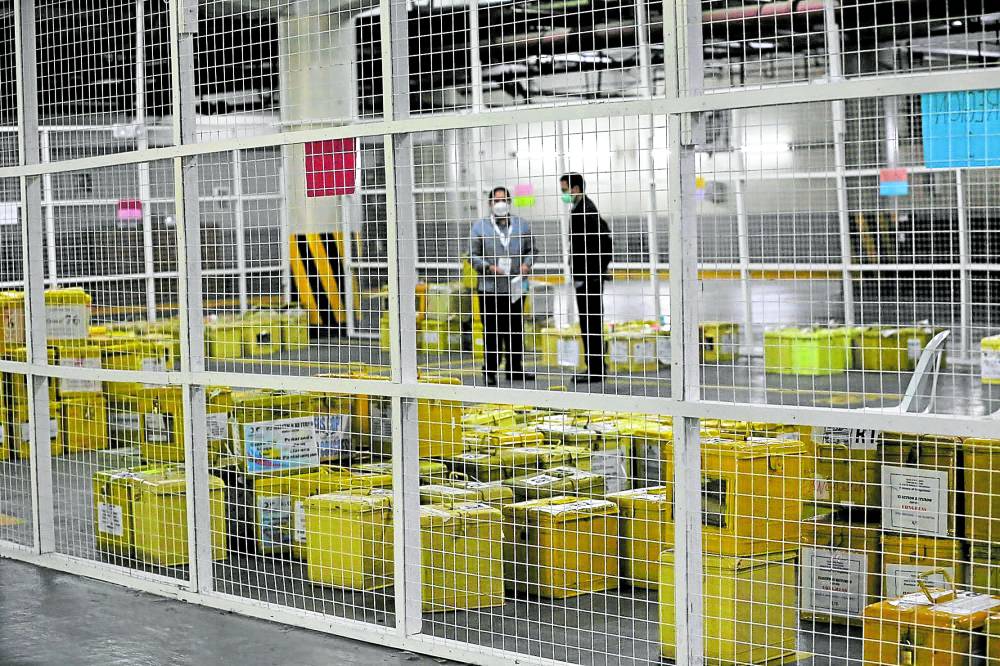No stopping Congress canvass, senators stress

ALL SET FOR THE CANVASS Ballot boxes containing election returns for the presidential and vice presidential elections are kept under tight guard at the Senate building in Pasay City. They will be brought to the House of Representatives for canvassing by a joint session of Congress next week despite a petition in the Supreme Court not to proclaim Ferdinand Marcos Jr. as the new president. —RICHARD A. REYES
Senate leaders on Thursday said they could not stop the canvass of votes for president and vice president, which would start next week, as this was mandated on Congress, and halting the count as requested in a petition to the Supreme Court could create a constitutional crisis.
The tribunal has given presumptive President Ferdinand Marcos Jr. 15 days to respond to the first of two petitions challenging the decision of the Commission on Elections (Comelec) to let him run for president in the May 9 polls.
During their full court session on Thursday, the tribunal issued the same order to the Comelec as well as the Senate and the House of Representatives.
Both chambers of Congress will convene as the National Board of Canvassers and start the official canvassing of the presidential and vice presidential election results on May 24.
“Without necessarily giving due course thereto, it is necessary and proper to require the respondents to comment on the petition and prayer for temporary restraining order within a period of 15 days from notice,” read the Supreme Court en banc resolution dated May 19.
Article continues after this advertisementEven before receiving the court’s order, Marcos’ lawyer, Estelito Mendoza, submitted a manifestation on Thursday, telling the court that it had no authority to stop the count.
Article continues after this advertisementCall for a TRO
The petitioners asked the high tribunal to issue a temporary restraining order (TRO) and to stop Congress from proclaiming the son and namesake of the late ousted dictator as the country’s new president after unofficial tallies showed him leading his main rival, Vice President Leni Robredo, with more than 31 million votes.
Opposition stalwart and Senate Minority Leader Franklin Drilon said the Supreme Court as a coequal branch of government, cannot stop Congress from performing a constitutional duty.
“If Congress is stopped by the Supreme Court from canvassing the votes, what will happen after June 30, 2022, when President Duterte’s term expires? We will have no President. There will be constitutional crisis,” he said in a statement.
Drilon noted that the petition to stop Congress from canvassing is based on the allegation that Marcos was disqualified from running for public office because of a conviction for violating the tax code.
“But Congress does not have the power to pass upon the qualification of (Marcos). Its power is only to proclaim the winner on the basis of the (certificates of canvass) it received,” he said.
Courting a crisis
The power to pass upon Marcos’ capacity to hold office is determined by the Supreme Court, sitting as a Presidential Electoral Tribunal, Drilon said.
Senate President Vicente Sotto III agreed with Drilon that Congress should not stop the canvass.
“If that happens, we will be courting a constitutional crisis from the fact that Congress can no longer meet after June 3rd. Who will then conduct the canvass as mandated by the Constitution?” Sotto said.
He cited July 25 as a “key date” because that is when the newly elected president delivers the State of the Nation Address at the opening of the 19th Congress.
“So, no president or (vice president) by June 30? What do they propose? Holdover? Tell me if that is not a crisis!” Sotto said.
Senate Majority Leader Juan Miguel Zubiri, who was reelected, said in a Facebook post that Congress was “constitutionally bound” to canvass the results of the presidential and vice presidential elections.
“Nothing prevents us from performing this duty to ensure the peaceful transfer of power,” he said. “That is our democracy and that is our sworn duty to the Filipino people.”
‘Time is of the essence’
A group representing political detainees and activists who opposed the dictatorship asked the Supreme Court to reverse the Jan. 17 and the May 10 Comelec decisions that cleared the legal obstacles to Marcos’ candidacy.
“We are glad that the Supreme Court has required comment on the petition but considering that time is of the essence, we hope that the period may be considered inextendible,” said Theodore Te, lawyer for the petitioners.
“The petition is one of first impression and of grave public interest and we hope that the Court will be given the opportunity to rule substantively on the issues raised,” he added.
He declined to comment on the statements made by Sotto and Senators Zubiri and Drilon.
“The Senate is impleaded and has been asked to comment. We will just wait for their comment and will file an appropriate reply if needed,” said Te.
Second petition
The Supreme Court has yet to act on a second similar petition filed by members of the Campaign Against the Return of the Marcoses and Martial Law and martial law survivors represented by lawyer Howard Calleja.
Mendoza, who served as solicitor general during the dictatorship, said that under Article VII of the Constitution, President Duterte’s term ends and the term of the incoming president would begin at noon on June 30, 2022.
He also cited Section 4 of Article VII mandating the Senate and the House of Representatives in joint session to canvass the votes for president and vice president.
“All of the above provisions, in language and intent, are mandatory and the Supreme Court is without jurisdiction to prevent their implementation,” Mendoza said in his three-page manifestation.
READ: Congress sees proclamation of President, VP before June